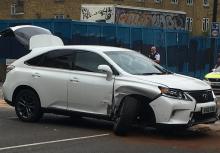Recent increases in road fatalities should be a wake-up call for the UK Government to step up and provide stronger leadership on road safety, say members of parliament in a report examining the Government's Strategic Framework for Road Safety.
Recent increases in road fatalities should be a wake-up call for the UK Government to step up and provide stronger leadership on road safety, say members of parliament in a report examining the Government's Strategic Framework for Road Safety.
Launching the report, Louise Ellman, chair of the Transport Committee said, "We are very concerned that 2011 saw the first increase in road fatalities since 2003, with 1,901 people killed on the roads. It is shocking that road accidents are the main cause of death amongst young adults aged 16-24 and that so many cyclists continue to be killed or injured. In 2010 there were 283 fatalities amongst car occupants aged 16-25. 27 per cent of young men aged 17-19 are involved in a road collision within the first year of passing their test. If the government is not willing to set targets, it should show more leadership. Action is required to improve road safety for young drivers, including an independent review of driver training. We welcome the attention cycling has received but there is much more to do."
The Transport Committee also highlights the variability in road safety performance between local authorities.
The committee urges the Government to use the opportunity presented by a planned update for the Strategic Framework for Road Safety in September 2012 to reassess its road safety strategy. More attention should be given to engineering improvements in road design and technology and the Government should account for recent increases in the number of road fatalities.
Launching the report, Louise Ellman, chair of the Transport Committee said, "We are very concerned that 2011 saw the first increase in road fatalities since 2003, with 1,901 people killed on the roads. It is shocking that road accidents are the main cause of death amongst young adults aged 16-24 and that so many cyclists continue to be killed or injured. In 2010 there were 283 fatalities amongst car occupants aged 16-25. 27 per cent of young men aged 17-19 are involved in a road collision within the first year of passing their test. If the government is not willing to set targets, it should show more leadership. Action is required to improve road safety for young drivers, including an independent review of driver training. We welcome the attention cycling has received but there is much more to do."
The Transport Committee also highlights the variability in road safety performance between local authorities.
The committee urges the Government to use the opportunity presented by a planned update for the Strategic Framework for Road Safety in September 2012 to reassess its road safety strategy. More attention should be given to engineering improvements in road design and technology and the Government should account for recent increases in the number of road fatalities.






